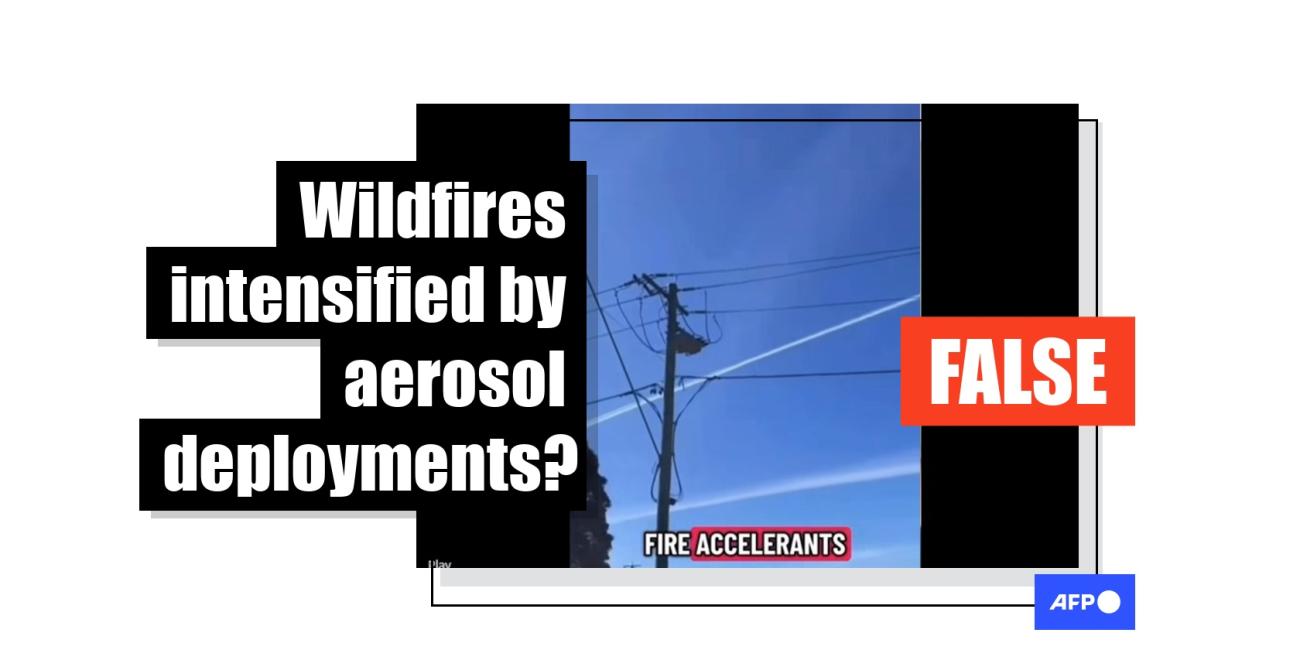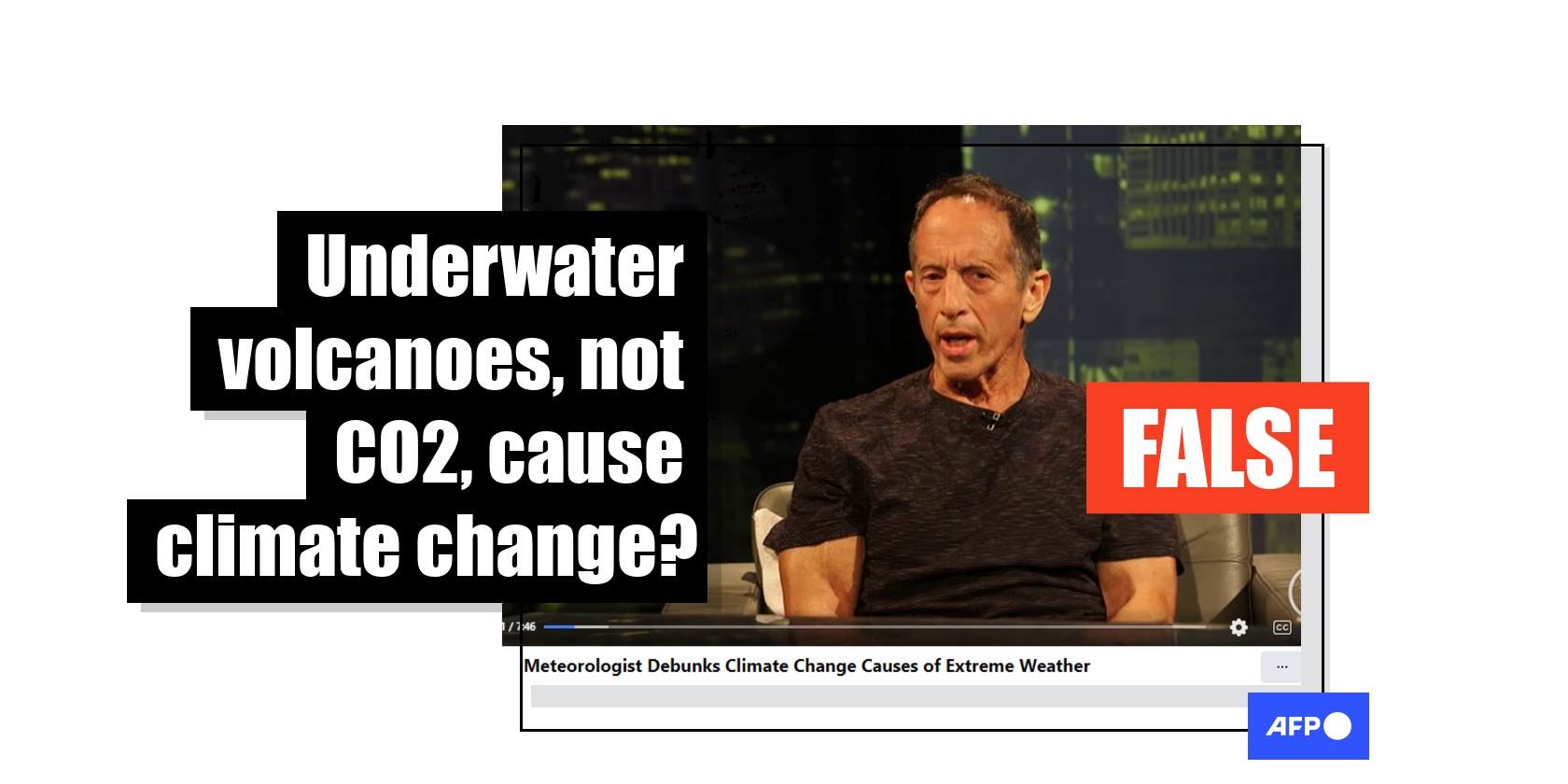
Weatherman makes misleading climate claims on volcanoes, trees, floods
- This article is more than two years old.
- Published on October 26, 2023 at 18:31
- 7 min read
- By Roland LLOYD PARRY, AFP France
US weatherman Joe Bastardi, chief forecaster for analytics group WeatherBELL and a prominent climate change skeptic with previous links to the fossil fuel industry, made the claims in an interview with presenter Stu Burguiere on streaming service BlazeTV, posted on Facebook on October 4.
Bastardi said global warming was due to a "cumulative build-up of water vapor over the years, since these underwater volcanoes have been going off," along with successive occurrences of the El Niño warming phenomenon.
"But what really set it off was that big underwater volcano last year," he said, referring to the eruption of Hunga Tonga-Hunga Ha'apai (HTHH) in January 2022. "These hotspots that develop in the ocean affect the weather."
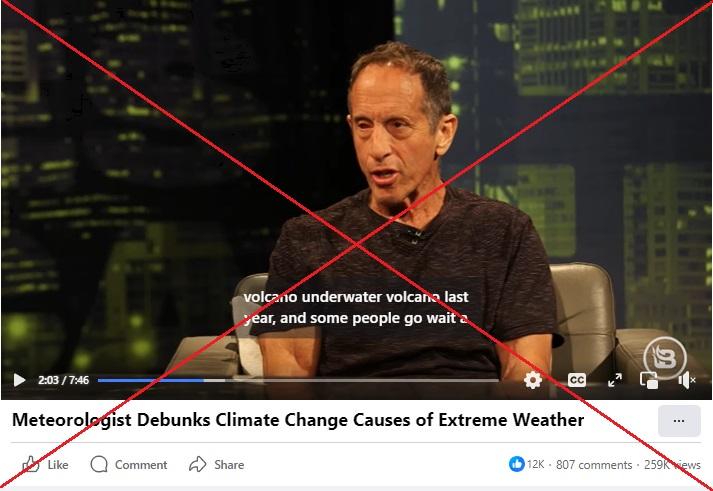
The eruption -- the biggest ever recorded according to New Zealand scientists -- fired gases and aerosols over 50 kilometers high and warmed the atmosphere, research showed (archived here). But experts said the claim that underwater volcanoes were causing Earth's broader warming was false.
"Even this massive eruption was not enough to change the global surface temperature by more than a few hundredths of a degree Celsius, and even then only temporarily until the perturbation dissipates over five or so years," said physicist Stuart Jenkins, lead author of an Oxford University study (archived here) on the Tonga eruption.
Several studies have indicated that the Tonga eruption could warm the atmosphere over the next five years because it forced up a huge amount of water vapor, a greenhouse gas.
Jenkins's team concluded that this could help push Earth's warming above the 1.5C mark identified by scientists as a key threshold for severe climate impacts.
However, they said that in the longer term, the warming depended on human emissions. Global temperatures have so far risen by around 1.2C compared to pre-industrial levels.
"We would need a huge number of large eruptions like Tonga continuously going off to sustain a 1.2C global warming level, and even more to increase it over time as we have observed with global temperatures," Jenkins told AFP in an email on October 11, 2023.
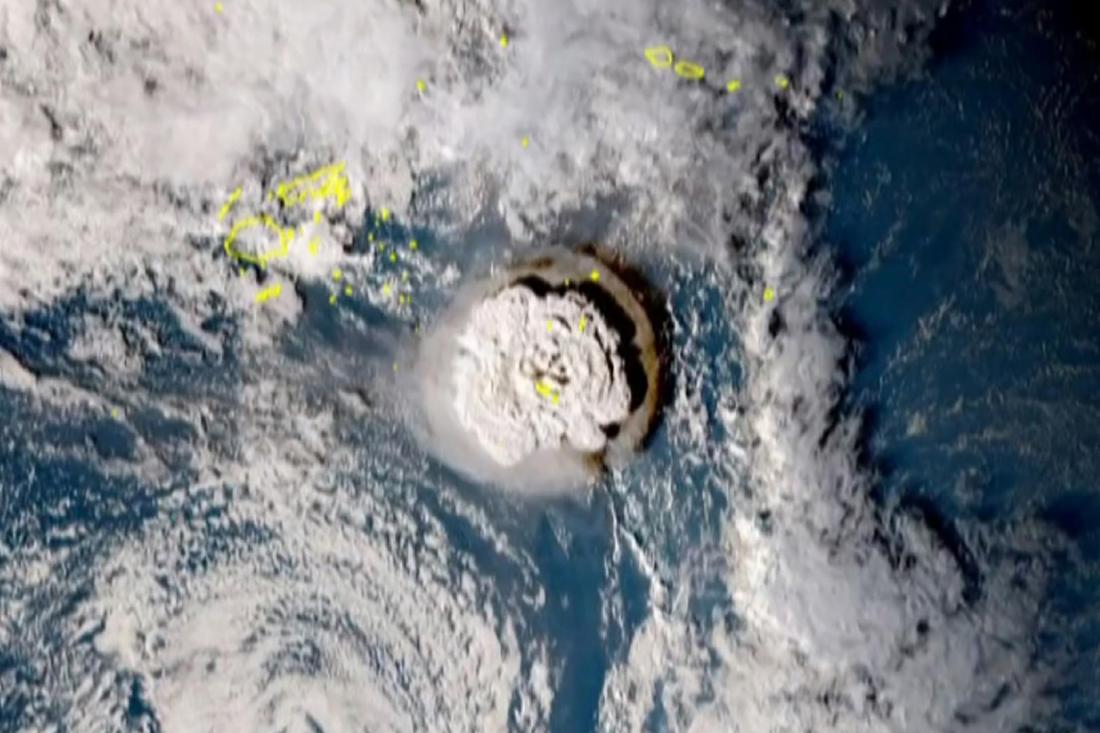
'Absurd' volcano theory
The Intergovernmental Panel on Climate Change (IPCC) has comprehensively documented the climate-changing role of human-caused emissions of carbon dioxide and other greenhouse gases (archive).
"The notion that underwater volcanoes could be the primary cause of global warming is frankly absurd... the heat (all volcanoes) release is a negligible contribution to Earth's total energy budget," Georg Feulner, a senior scientist at the Potsdam Institute for Climate Impact Research, told AFP in an email on October 12, 2023.
"Furthermore, there is no evidence for increased volcanic activity in recent decades, much in contrast to atmospheric carbon dioxide concentrations which are still rising -- and causing warming, as has been known since the 19th century."
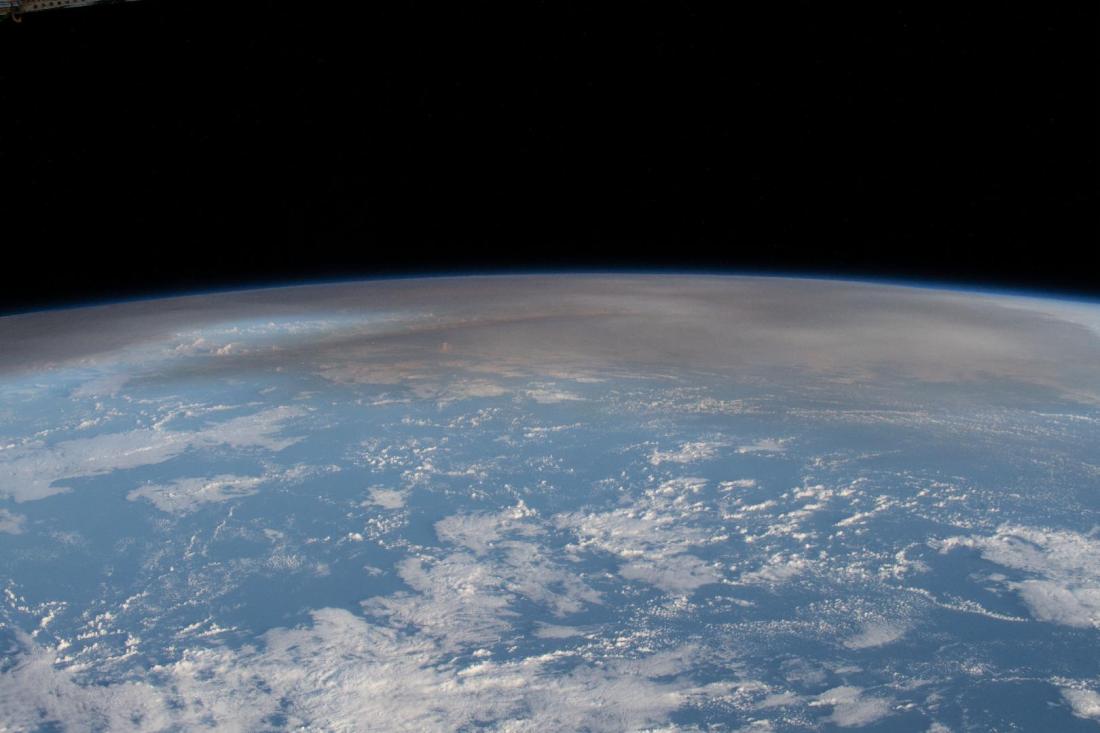
Above-ground volcanic eruptions can cool the Earth by ejecting particles that reflect the Sun's heat. The underwater Tonga blast was different in that it also expelled huge amounts of water vapor.
But "the effect would dissipate when the extra water vapor cycles out of the stratosphere and would not be enough to noticeably exacerbate climate change effects," NASA said in an analysis (archived here).
Jenkins acknowledged "hot and cold spots" on Earth's surface can influence individual weather events, but "averaged over the globe (they) are not contributors to the long-term global warming we have observed."
Impact of US trees
Among other statements in the video, Bastardi said: "The United States has enough foliage to get rid of all the (CO2) emissions we have. We have 229 billion trees in the United States."
The number is backed by a study published in science journal Nature in 2015 which calculated that the United States had more than 228 billion trees (data in "supplementary table 2").
Data from the Global Carbon Project show that the United States in 2021 emitted over five billion tonnes of CO2 (archived here).
Figures from Global Forest Watch meanwhile indicate that between 2001 and 2022 the country's forests removed far less: 1.52 billion tonnes of CO2-equivalent gases -- a measure that factors in other greenhouse emissions such as methane (archived here). Taking into account the amount of carbon emitted by forests, the net amount absorbed was just over 700 million tonnes -- less than a seventh of the total.
Separate data published by the Environmental Protection Agency's Greenhouse Gas Inventory indicate that US land and forests together absorbed a net amount of about 750 million tonnes of CO2 in 2021:
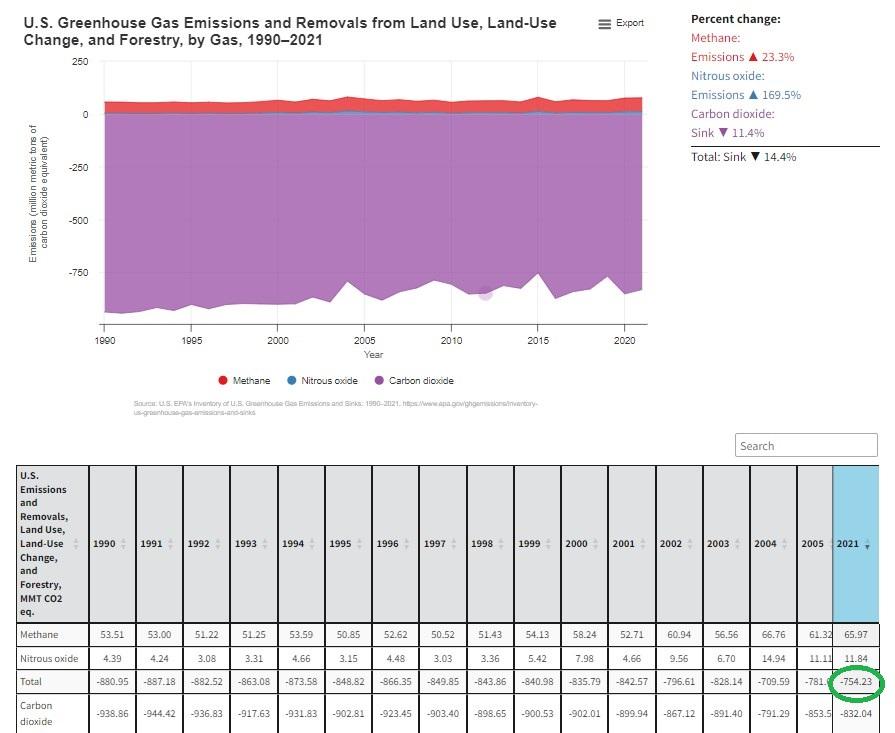
US land and forests "are a much smaller net sink than the US's fossil fuel emissions," said David Gibbs, a lead researcher at Global Forest Watch.
New York flood claims
Bastardi rejected warnings that a storm that flooded subways and an airport in New York on September 29 was worsened by climate change, which warms the oceans.
"You look at the New York City temperatures, they've been below normal for the period that this storm occurred and… the sea surface temperatures have cooled dramatically around New York," he added, rejecting the notion that the storm was driven by a warmer ocean.
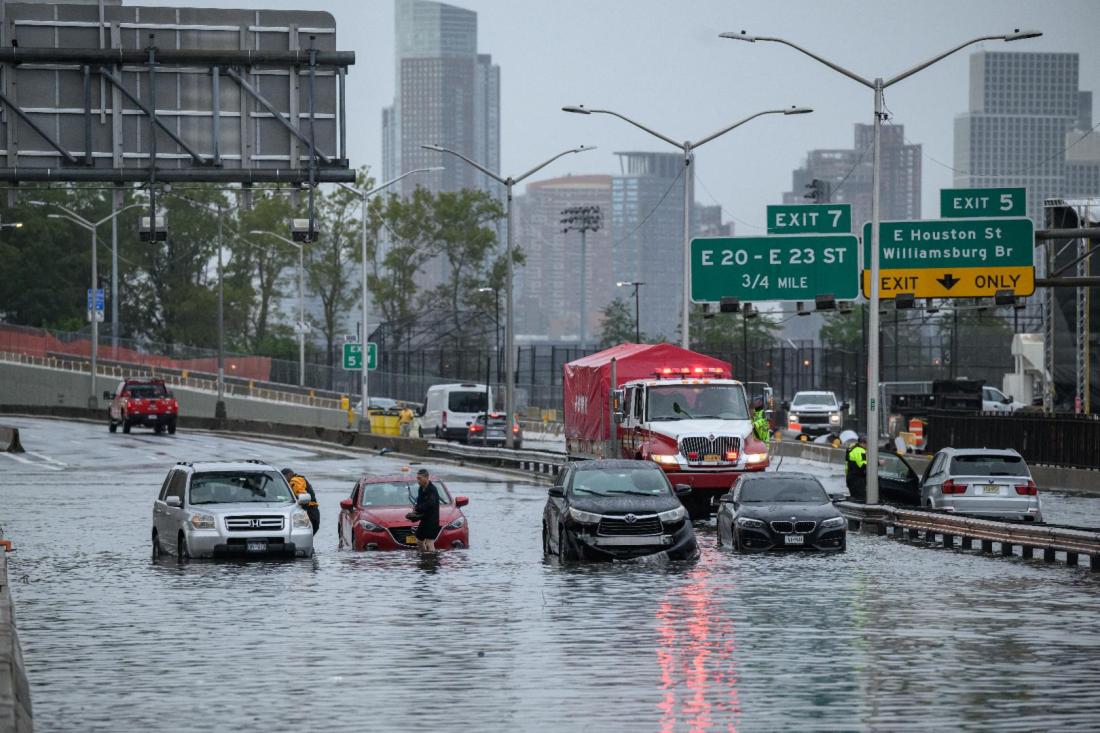
Data from the US National Oceanic and Atmospheric Administration (NOAA) indicate the weather in New York was cooler than normal on the day of the storm. But "the Sept 2023 NYC flooding event is associated with a storm on a much larger scale, and attributing it to local temperature highs and lows at that specific time is not of much relevance at all," NOAA said in an emailed statement.
In the longer term, NOAA charts (1, 2 and 3) of measurements from three points around New York indicate the average sea-surface temperature has risen slightly over the past three decades (archives: 1, 2, 3).
A US government analysis of NOAA data going back to 1901 found "heavy precipitation is becoming more intense and more frequent across most of the United States, particularly in the Northeast and Midwest." The impact has been uneven, however, with some regions struck by droughts.
The IPCC judged in a major 2021 report (archive) that "the frequency and intensity of heavy precipitation events have increased since the 1950s over most land area for which observational data are sufficient for trend analysis… and human-induced climate change is likely the main driver."
Links to industry
Investigative website DeSmog has documented Bastardi's links to the fossil fuel industry (archive). Broader research has indicated that big firms in the industry have worked to misinform the public about the role of fossil fuel emissions in climate change.
In documents published by DeSmog, Bastardi was listed among the speakers at forums held by a gas company in 2015 and 2016. One of the events was sponsored by companies including oil majors BP and Shell, photos showed.
In 2013 and 2014 he was listed as a speaker at coal industry conferences in New York and Colorado – at the latter, he called human-caused climate change a "scam."
In the October 2023 video, Bastardi pointed to carbon capture, an emerging climate measure popular with oil companies under pressure to cut emissions.
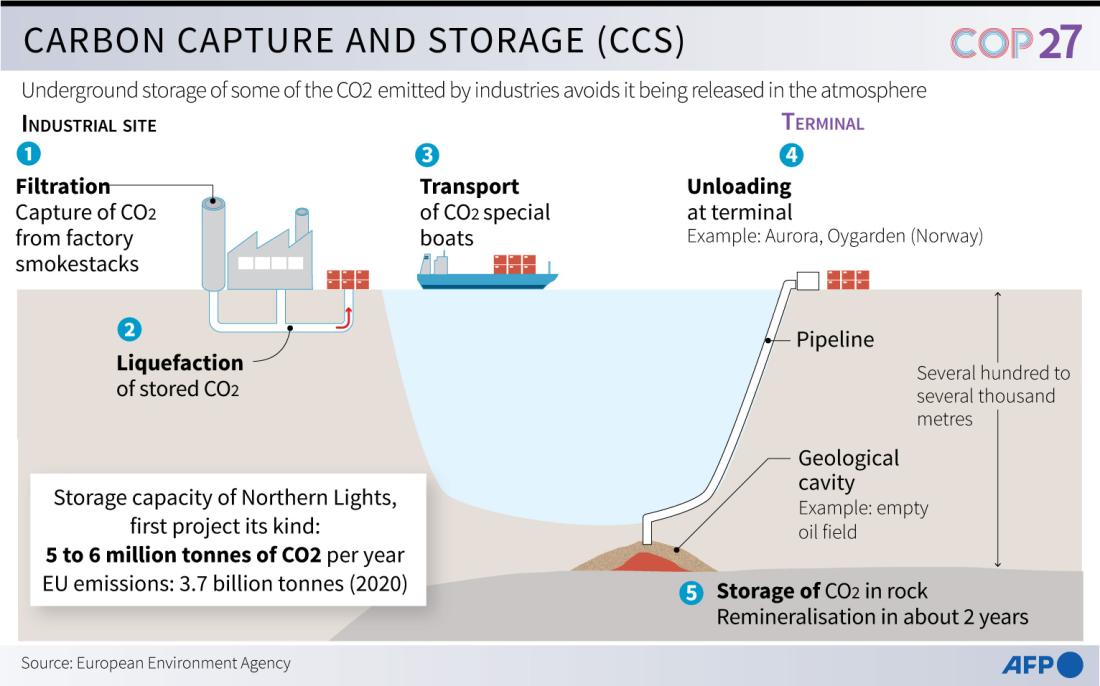
"You want to get rid of it, you plant more trees, nuclear power, and we have something else called point-of-combustion carbon capture now, in other words, you don't have to let it go out. No one even knows about that," he said.
The IPCC considers it one of the methods necessary to combat global warming. Carbon-capture, utilization and storage (CCUS) technology is evolving, with more than 500 projects in various stages of development, the International Energy Agency says.
But it cautions: "Nevertheless, even at such (a) level, CCUS deployment would remain well below what is required in the Net Zero Scenario" -- the pathway towards keeping global warming below the key 1.5C mark.
More of AFP's reporting on climate misinformation is available here.
Copyright © AFP 2017-2026. Any commercial use of this content requires a subscription. Click here to find out more.
Is there content that you would like AFP to fact-check? Get in touch.
Contact us

